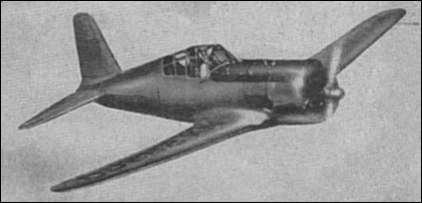|
| Developed as a single-seat fighter for export, powered by an 894.2kW Pratt & Whitney R-1830-53C4-G engine. Most production aircraft, given the USAAF designation P-66, found their way to China from 1940.

| MODEL | P-66 |
| CREW | 1 |
| ENGINE | 1 x Pratt-WHitney R-1830-33 Twin Wasp, 895kW |
| WEIGHTS |
| Take-off weight | 3349 kg | 7383 lb |
| Empty weight | 2375 kg | 5236 lb |
| DIMENSIONS |
| Wingspan | 10.97 m | 36 ft 0 in |
| Length | 8.66 m | 28 ft 5 in |
| Height | 2.87 m | 9 ft 5 in |
| Wing area | 18.3 m2 | 196.98 sq ft |
| PERFORMANCE |
| Max. speed | 547 km/h | 340 mph |
| Ceiling | 8595 m | 28200 ft |
| Range | 1529 km | 950 miles |
| ARMAMENT | 4 x 7.62mm, 2 x 12.7mm machine-guns |
 | A three-view drawing (1280 x 972) |
| Klaatu83, e-mail, 26.03.2017 05:35 The P-66 was not a bad fighter, but it a distinctly pre-war aircraft and could not compete on even terms with the Japanese fighters that it would eventually face in China. For example the Nakajima Ki-43 Hyabusa, which had an engine of roughly the same horsepower as that of the P-66, was considerably lighter, more maneuverable and possessed of a much greater rate of climb. reply | | J Runfeldt, e-mail, 31.10.2015 20:48 Sweden ordered 144 of these, none were delivered. We also ordered 120 Seversky EP-1 and 60 Seversky Guardsman, 60 EP-1 and 2(two) Guardsman were delivered. We had to scrounge Europe for surplus fighters, and found replacements in Italy, Fiat CR42 and Reggiane Re2000. Then we decided to build our own fighters, and came up with the FFVS J22. We also had to extend our programmes for SAAB B17 and licence-built Northrop 8A-1.
Important lesson, when TSHTF you can't really depend on anyone but yourself. reply | | Geo Genevro, 14.02.2015 21:17 The P and W R-1830 used in the P-66 differed from the engine used in the Wildcat in not having two stage supercharging. The Douglas SBD used a Wright R-1820. reply | | D. Howerton, e-mail, 22.07.2014 00:21 The Vultee P-66 was powered by the same 1200hp P&W 1830 radial engine used in the Grumman F4F Wildcat, the Douglas DC-3 /C-47 Skytrain, and the PBY Catalina. All aircraft would have benefited from a power upgrade to the 1350hp version of the engine, as would the Douglas SBD-5 Avenger dive bomber. Commonality of engines might have simplified supply and maintenance for the military during the war. The P-66 would also have benefited from a design change by giving some rearward sweep to the vertical stabilizer and increasing the firepower by replacing the .30 caliber machine guns in the wings with either a couple of .50 cals or 20mm cannons, a fuselage rack for a 500lb bomb or fuel tank, and a couple of wing mounted racks for rockets. With its limited climb and altitude capability, the only viable role the P-66 could have played would have been as a ground attack /interdiction aircraft, leaving air superiority, escort, and interception missions to the far more capable P-38s and P-51s. reply | |
| | Walt Moore, e-mail, 03.09.2012 17:38 One of my favorites, not for its service record, but for it being an example of state-of the-art technology in 1939 - 40. it just didn't have the ruggedness or versatility of the P-36 - P-40 series. Makes an example modeling subject, however. reply | | James Murray, e-mail, 20.08.2012 23:17 This plane looks similar to the F-4U Corsair. What with it's tail section and cockpit glass. Close, but not quite . reply | | Leo Rudnicki, e-mail, 03.06.2009 05:41 Google Vultee P-66 Vanguard. Just watched a video of a model flying, and pictures of the original nose. And remember that the original idea, on the XP-42 and FW-190 as well as the P-66, was a total failure. reply | | Joey Reinleib, e-mail, 03.06.2009 04:45 Wish there was more detail on the prototype with the extended propshaft that was supposed to simulate an in-line streamlined looking ship. Does anybody know where blueprints could be gotten? reply |
|
Do you have any comments?
|
| 
COMPANY
PROFILE
All the World's Rotorcraft
|








